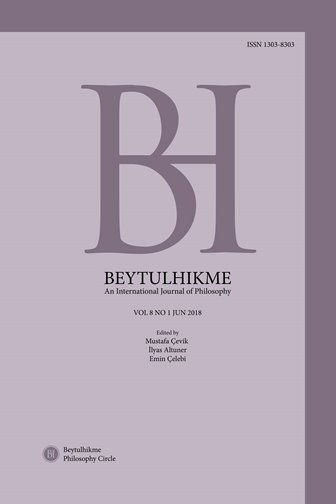Author :
Abstract
Foucault'ya göre Kant ve Kant sonrası eleştiri evrensellik ilkesinden tarihsellik ilkesine bir geçiş olarak özetlenebilir. Tarihselliğe ve olumsallığa geçiş, sosyal dönüşümü olanaklı kılan transgresif eleştiri olasılığını doğurur. Bu yazı, Nietzsche'nin düşüncesini Kant sonrası eleştirinin önemli bir örneği olarak inceler. Nietzsche'de eleştiri, tüm değerlerin yeniden değerlendirilmesi olarak karşımıza çıkar. Bu yeniden değerlendirme pratiği, tarihsel ve maddesel limitleri görünür kıldığı ölçüde bu limitlerin aynı zamanda ötesine geçme yollarının da açınsaması niteliğindedir. Dolayısıyla Nietzscheci eleştiri, sonu olmayan bir üstün gelme çabasına tekabül ederek bir tür güç istenci konumundadır. Böylece Nietzsche felsefenin bedenselliğinden yola çıkarak eleştiriyi bir tür semptomatoloji olarak sunar.
Keywords
Abstract
Foucault gives an account of the contrast between Kantian and post-Kantian critique, which can be summarized as a shift from universality to historicity. This shift to historicity and contingency, for Foucault, opens up the possibility of transgressive critical engagement whereby social transformation can take place. In this essay, it is argued that Nietzsche’s work constitutes an example of post-Kantian critique insofar as Nietzsche undertakes critique in the form of revaluation of values through which the historico-corporeal limits are exposed and ways to overcome them are delineated. In this way, Nietzschean critique is an instance of will to power inasmuch as it refers to an endless movement of overcoming. Nietzsche thereby offers critique as a kind of symptomatology that is tied to the corporeality of philosophy.
Keywords
- Butler, J. (2004). What is Critique? An Essay on Foucault’s Virtue. The Judith Butler Reader. (Eds. S. Salih & J. Butler). Malden, NJ: Blackwell Publishing, 302-22.
- Deleuze, G. (2006). Nietzsche and Philosophy. (Trans. H. Tomlinson). New York: Columbia University Press.
- Foucault, M. (1980). Nietzsche, Genealogy, History. Language, Counter-Memory, Practice: Selected Essays and Interviews. (Ed. D. F. Bouchard). Ithaca: Cornell University Press, 139-64.
- Foucault, M. (2010). What is Enlightenment? Foucault Reader. (Ed. P. Rabinow). New York: Vintage Books, 32-50.
- Marsden, J. (1998). Critical Incorporation: Nietzsche and Deleuze. Journal of Nietzsche Studies, 16, 33-48.
- Mellamphy, D. & Mellamphy, N. B. (2005). In ‘Descent’ Proposal: Pathologies of Embodiment in Nietzsche, Kafka, and Foucault. Foucault Studies, 3, 27-48.
- Nietzsche, F. (1968). Will to Power. (Trans. W. Kaufmann). New York: Vintage Books.
- Nietzsche, F. (1974). The Gay Science. (Trans. W. Kaufmann). New York: Vintage
- Nietzsche, F. (1976a). The Twilight of the Idols. (Trans. W. Kaufmann). The Portable Nietzsche. (Ed. W. Kaufmann). London: Penguin Books.
- Nietzsche, F. (1976b). Thus Spoke Zarathustra. (Trans. W. Kaufmann). The Portable
- Nietzsche, F. (1989b). Ecce Homo. (Trans. W. Kaufmann). On the Genealogy of Mor- als & Ecce Homo. (Ed. W. Kaufmann). New York: Vintage Books.
- Nietzsche, F. (1989c). On the Genealogy of Morals. (Trans. W. Kaufmann & R. J. Hollingdale). On the Genealogy of Morals & Ecce Homo. (Ed. W. Kaufmann). New York: Vintage Books.
- Vallega-Neu, D. (2006). The Bodily Dimension in Thinking. Albany: SUNY Press. Öz: Foucault'ya göre Kant ve Kant sonrası eleştiri evrensellik ilkesinden tarihsellik ilkesine bir geçiş olarak özetlenebilir. Tarihselliğe ve olumsallığa geçiş, sosyal dönüşümü olanaklı kılan transgresif eleştiri olasılığını doğurur. Bu yazı, Nietzsche'nin düşüncesini Kant sonrası eleştirinin önemli bir örneği olarak inceler. Nietzsche'de eleştiri, tüm değerlerin yeniden değerlendirilmesi olarak karşımıza çıkar. Bu yeniden değerlendirme pratiği, tarihsel ve maddesel limitleri görünür kıldığı ölçüde bu limitlerin aynı zamanda ötesine geçme yollarının da açınsaması niteliğindedir. Dolayısıyla Nietzscheci eleştiri, sonu olmayan bir üstün gelme çabasına tekabül ederek bir tür güç istenci konumundadır. Böylece Nietzsche felsefenin bedenselliğinden yola çıkarak eleştiriyi bir tür semptomatoloji olarak sunar. Anahtar Kelimeler: Nietzsche, eleştiri, güç istenci, beden, Foucault.
